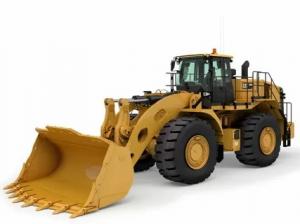Global Lightweight Compact Wheel Loader Market Projected to Reach USD 34.6 Billion by 2035 on Back of Versatile Usage
Lightweight Compact Wheel Loader Market grows with demand for efficient, versatile equipment in urban construction, landscaping, and agriculture.
Lightweight compact wheel loaders are gaining traction as a preferred equipment choice for urban infrastructure projects, small-scale farming operations, and public maintenance applications. Their compact footprint, ease of operation, and low fuel consumption make them particularly suitable for tasks that require both power and agility. In agriculture, they are replacing traditional tractors for loading, stacking, and material transport. In urban areas, municipalities are increasingly adopting compact loaders for street cleaning, snow removal, and utility work. As global infrastructure investments continue to rise—especially in emerging economies—the adoption of these machines is expected to accelerate significantly.
Get Ahead with Our Report: Request Your Sample Now!
https://www.futuremarketinsights.com/reports/sample/rep-gb-11429
Key Takeaways for the Lightweight Compact Wheel Loader Market
The compact nature and versatility of lightweight wheel loaders are key factors driving their uptake across a variety of industries. Their ability to accommodate different attachments has made them indispensable for tasks ranging from digging and trenching to transporting materials. Growth is particularly strong in Asia-Pacific and North America due to ongoing residential and commercial infrastructure projects. Moreover, the aftermarket for attachments and spare parts is booming, contributing to long-term revenue generation for manufacturers. The demand for machines with low emissions and better fuel efficiency is pushing companies to innovate with electric and hybrid models.
Emerging Trends in the Global Market
One of the most notable trends in the lightweight compact wheel loader market is the rapid shift toward electrification. With increasing emphasis on reducing carbon footprints, manufacturers are investing in the development of electric and hybrid variants to meet emission regulations and cater to environmentally conscious buyers. Battery-powered compact wheel loaders, with their quiet operation and zero tailpipe emissions, are gaining popularity in urban settings and indoor environments such as warehouses and logistics centers.
Another emerging trend is the integration of advanced telematics and automation features. Telematics systems are helping operators and fleet managers monitor machine performance, fuel usage, and maintenance needs remotely, thereby increasing operational efficiency and reducing downtime. Furthermore, advancements in ergonomics and operator safety are becoming a top priority, with cabins designed for enhanced visibility, comfort, and intuitive control systems.
Significant Developments in the Global Sector: Trends and Opportunities in the Market
Several manufacturers are expanding their product portfolios to include lightweight models that offer higher payload capacities while maintaining compactness and agility. This strategy is allowing companies to address broader customer needs in both rural and urban markets. The growing popularity of rental services is also creating opportunities for compact loader manufacturers, as small contractors and seasonal businesses prefer renting over outright purchasesThe surge in urban infrastructure and agricultural mechanization is fueling the demand for lightweight compact wheel loaders, making them a vital asset across multiple industries.
Technological convergence is opening up new possibilities in equipment design and manufacturing. For instance, the use of composite materials is reducing machine weight without compromising structural integrity. Such innovations are enabling loaders to operate more efficiently and with less wear on tires and mechanical components. Additionally, government incentives for clean equipment and smart city infrastructure are encouraging municipalities to invest in modern, compact, and eco-friendly machines.
Recent Developments in the Market
Recent years have seen a flurry of product launches and strategic expansions aimed at capitalizing on the growing demand for compact loaders. Companies such as Bobcat, JCB, and Caterpillar have introduced electric and hybrid models to meet sustainability goals and regulatory compliance. Manufacturers are also forming partnerships with tech firms to embed AI and machine learning capabilities for predictive maintenance and performance optimization.
In 2024, Bobcat unveiled a fully electric compact loader aimed at reducing noise and emissions in residential areas. Similarly, Volvo CE expanded its lineup with connected machines that offer real-time diagnostics and performance monitoring. These developments are setting the stage for a more technology-driven and sustainable future in the lightweight compact wheel loader space.
Detailed Market Study: Full Report and Analysis
https://www.futuremarketinsights.com/reports/lightweight-compact-wheel-loader-market
Competition Outlook
The lightweight compact wheel loader market is highly competitive, with several global and regional players vying for market share through innovation, customization, and strong distribution networks. Leading manufacturers are investing in R&D to develop machines with higher efficiency, lower environmental impact, and enhanced operational features. Market competition is increasingly centered on product differentiation through intelligent systems, attachment versatility, and eco-friendly technology.
Key players in the market include Bobcat Company, JCB Ltd., Caterpillar Inc., Volvo Construction Equipment, CNH Industrial N.V., Deere & Company, Komatsu Ltd., Hitachi Construction Machinery, Wacker Neuson SE, and Doosan Infracore. These companies are focusing on strategic expansions, partnerships, and product launches to strengthen their market position globally.
Key Segmentations
The lightweight compact wheel loader market is segmented by propulsion type, application, end-user, and region. By propulsion type, the market includes diesel, electric, and hybrid loaders, with the electric segment expected to grow rapidly due to emissions regulations and urban demand. Application-wise, loaders are used in construction, agriculture, landscaping, and municipal operations, with construction and municipal usage accounting for the majority share due to infrastructure and public service investments.
By end-user, the segmentation includes rental service providers, government agencies, and private contractors. Rental companies are seeing increasing demand for compact loaders as small and medium-sized businesses seek cost-effective, flexible equipment solutions. Geographically, the market is segmented into North America, Europe, Asia-Pacific, Latin America, and the Middle East & Africa, with Asia-Pacific expected to dominate due to high urbanization and infrastructure growth in China and India.
Automotive Vehicles Industry Analysis Reports
Compact Wheel Loaders Market Outlook 2025 to 2035
https://www.futuremarketinsights.com/reports/compact-wheel-loaders-market
Compaction Machines Market Outlook from 2025 to 2035
https://www.futuremarketinsights.com/reports/compaction-machines-market
Autonomous Vehicles Market Outlook from 2025 to 2035
https://www.futuremarketinsights.com/reports/autonomous-vehicles-market
Fire Truck Market Outlook from 2025 to 2035
https://www.futuremarketinsights.com/reports/fire-trucks-market
Crawler Excavator Market Outlook 2025 to 2035
https://www.futuremarketinsights.com/reports/crawler-excavator-market
Ankush Nikam
Future Market Insights, Inc.
+91 90966 84197
email us here
Visit us on social media:
LinkedIn
Facebook
YouTube
X
Legal Disclaimer:
EIN Presswire provides this news content "as is" without warranty of any kind. We do not accept any responsibility or liability for the accuracy, content, images, videos, licenses, completeness, legality, or reliability of the information contained in this article. If you have any complaints or copyright issues related to this article, kindly contact the author above.
It’s Boba Time Expands to Texas, Deepens LA Roots with New August Store Openings
Japan Ski Experience Nominated in 2025 Ski Asia Awards
Digitech Auto Solutions Offers Same-Day Gauge Repair Service for GM Instrument Clusters
Więcej ważnych informacji
 Jedynka Newserii
Jedynka Newserii

 Jedynka Newserii
Jedynka Newserii

Handel

1 października ruszy w Polsce system kaucyjny. Część sieci handlowych może nie zdążyć z przygotowaniami przed tym terminem
Producenci, sklepy i operatorzy systemu kaucyjnego mają niespełna dwa miesiące na finalizację przygotowań do jego startu. Wówczas na rynku pojawią się napoje w specjalnie oznakowanych opakowaniach, a jednostki handlu powinny być gotowe na ich odbieranie. Część z nich jest już do tego przygotowana, część ostrzega przed ewentualnymi opóźnieniami. Jednym z ważniejszych aspektów przygotowań na te dwa miesiące jest uregulowanie współpracy między operatorami, których będzie siedmiu, co oznacza de facto siedem różnych systemów kaucyjnych.
Ochrona środowiska
KE proponuje nowy cel klimatyczny. Według europosłów wydaje się niemożliwy do realizacji

Komisja Europejska zaproponowała zmianę unijnego prawa o klimacie, wskazując nowy cel klimatyczny na 2040 roku, czyli redukcję emisji gazów cieplarnianych o 90 proc. w porównaniu do 1990 rok. Jesienią odniosą się do tego kraje członkowskie i Parlament Europejski, ale już dziś słychać wiele negatywnych głosów. Zdaniem polskich europarlamentarzystów już dotychczas ustanowione cele nie zostaną osiągnięte, a europejska gospodarka i jej konkurencyjność ucierpi na dążeniu do ich realizacji względem m.in. Stanów Zjednoczonych czy Chin.
Handel
Amerykańskie indeksy mają za sobą kolejny wzrostowy miesiąc. Druga połowa roku na rynkach akcji może być nerwowa

Lipiec zazwyczaj jest pozytywnym miesiącem na rynkach akcji i tegoroczny nie był wyjątkiem. Amerykańskie indeksy zakończyły go na plusie, podobnie jak większość europejskich. Rynki Starego Kontynentu nie przyciągają jednak już kapitału z taką intensywnością jak w pierwszej części roku. Z drugiej strony wyceny za oceanem po kolejnych rekordach są już bardzo wysokie, a wpływ nowego porządku celnego narzuconego przez Donalda Trumpa – na razie trudny do przewidzenia. W najbliższym czasie na rynkach można się spodziewać jeszcze większej zmienności i nerwowości, ale dopóki spółki pokazują dobre wyniki, przesłanek do zmiany trendu na spadkowy nie ma.
Partner serwisu
Szkolenia

Akademia Newserii
Akademia Newserii to projekt, w ramach którego najlepsi polscy dziennikarze biznesowi, giełdowi oraz lifestylowi, a także szkoleniowcy z wieloletnim doświadczeniem dzielą się swoją wiedzą nt. pracy z mediami.



![Nestlé w Polsce podsumowuje wpływ na krajową gospodarkę. Firma wygenerowała 0,6 proc. polskiego PKB [DEPESZA]](https://www.newseria.pl/files/1097841585/fabryka-nesquik_1,w_85,r_png,_small.png)




.gif)

 |
| |
| |
|